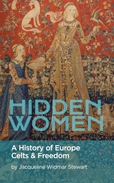
 |
What do the Celts have to do with the tax-exempt status of churches? Stewart’s book makes its way to a connection in this wide-ranging exploration of Celtic history. She begins with a song of praise to women and ends with a bulleted call to action for “going forward” to reclaim the values and cultural equilibrium achieved by the ancient Celts. Overall, the purpose of the book is to explore the hidden layers of Celtic history in Europe which can be found through archeological discoveries, analysis of Roman conquests, and a critique of the rise of Christianity. She invites readers to reconsider history by looking more closely at the role of women and of the family in the Celtic tradition.
Stewart acknowledges the role and value of “ancestral women” throughout the book and reminds readers that history is often written by the victor. As a result, women have been devalued in history and ignored as equal partners and leaders. This loss of place in history has ramifications still felt today as women strive for equality. But Stewart believes it is possible to uncover the history of the suppressed if one “seek(s) the Celtic layer in all of Europe”—for the Celtic layer revered women as creators, artisans, partners, and defenders of the family. Stewart leads the way in this endeavor for truth by examining the past, discovering new finds in the present, and inspiring the future.
Beautiful color photographs, informative maps, and copious endnotes all provide support for this well-researched historical inquiry and critique. Each section leads with a poem that highlights the theme and provides an effective contrast of tone and form to this reference book and historical guide. With this feminist view of history, Stewart has crafted an inclusive examination of the ancient Celts and the values they held. The work feels fresh and original as Stewart highlights ancient female warriors, feminist writers, thinkers, and archeologists. Women who have been neglected in the history books until Stewart resurrected their names set off a brief spark that will inspire the reader to mine other history books and biographies for more in-depth information.
Like Hidden Figures, a movie which also rescued amazing and accomplished women from obscurity, Stewart’s book reminds us that women have always influenced the ways of the world. Stewart digs deep into the ancient past, but the result is the same: women take their rightful place in the history of the world. These stories of women in history are extremely relevant and necessary as women today have ignited a new movement that demands attention. As the #MeToo movement gains traction, Stewart’s book feels prescient and wise as she seeks to take back history to tell the story of the Celts who treated women with reverence and the family as the core of the community. Just as the Me Too Movement challenges social norms, Stewart expertly challenges the legacy of a male hierarchy that has silenced and subjugated women.
With multi-disciplinary evidence and a persuasive voice, Stewart calls out the domineering historical legacies of conquerors and of religion that have sought to silence the stories of women. She argues elegantly for women without the shrill overtones of desperate anger that conservative critics might dismiss. Stewart’s tone will appeal to all readers of history as she celebrates Celtic women and connects their legacy with present-day social issues. Stewart, not content to merely criticize, offers solutions to the problems women face because of historical misrepresentations, inaccuracies, and the inheritance of patriarchy. Stewart’s advocacy is powerful and practical and is synchronized perfectly with the voices of today calling out for change.
A 2018 Eric Hoffer Book Award Montaigne Medal Finalist
RECOMMENDED by the US Review